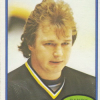Randy Carlyle

Randy Carlyle
Randolph Robert Carlyleis a Canadian former professional ice hockey player. He is currently the head coach of the National Hockey League's Anaheim Ducks and formerly the head coach of the Toronto Maple Leafs. He was raised in Azilda, just northwest of Sudbury, Ontario. He won the Stanley Cup in 2007 with the Ducks during his first stint with the team. As a player, Carlyle dressed for over 1000 games between the Toronto Maple Leafs, Pittsburgh Penguins and Winnipeg Jets, winning...
ProfessionCoach
Date of Birth19 April 1956
CityGreater Sudbury, Canada